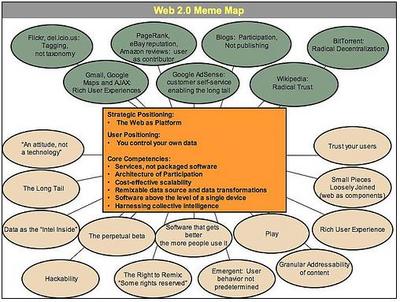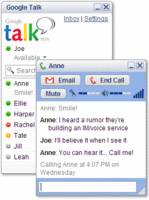 Tim O'Reilleys meme map on the Web 2.0 conference succinctly summarises how we are going to communicate, collaborate, share and do work in the future....
Tim O'Reilleys meme map on the Web 2.0 conference succinctly summarises how we are going to communicate, collaborate, share and do work in the future....This has been a long time coming... but it starts to show how emergent systems and disruptive technologies are starting to show a template of how this may all get mashed up together.
companies like Google get it... companies like Microsoft will get there eventually and probably quicker than we think....
- If we look at his map.... we see flickr, del.icio.us and craigslist representing the flat taxonomy school (tagging).
- We then have GMail, Google Maps, start.com (they have earned some respect) and AJAX bigging up themselves on the web UI space (did you know that Sergey was really into HCI - figures -- right?)
- We now understand the power of feedback loops and reputations systems and no one does it better than ebaY and amazon.
- Power to the people -- enabling the long tail, Google Adesense and Google Local is an example of how to exploit the non-profitable 80% market..
- Blogs -- are a way of recording chatter, lots of chatter, entwining hard and loose relationships through trackback/commenting. Cluster maps will allow us to see new relationships and correlations that we just wouldn't not have imagined.
- Power to the people -- go forth and scribe!; Wikipedia; this is a classic example of anarchy; or as Tim O'Reilley puts it Radical Trust. It's not a perfect system; but imperfect systems are an important process in the grand cosmic scheme of things. And in the end this controlled chaos usually works out fine in the end.
- Power to the nodes -- BitTorrent; is a peer-to-peer technology that scales up as more people use the network; perfectly designed for high performance peer2peer digital distribution. Again we see fault-tolerance and multi-node networks working together in harmony to deliver information in scaleable fashion.
Yet in all of this... as Scoble says no one mentioned RSS [and Podcasting]... surely the Tivo 'style' publish / subscribe model needs to be mentioned. RSS is being used in more ways than people had imagined (and probably in ways it shouldn't be used). Nevertheless, given the information overload we face and the urgency to get back in control, we are unwise to exclude RSS and (Podcasting with a healthy mixture of flat tagging thrown in) to radically sharpen our ability to control information.

